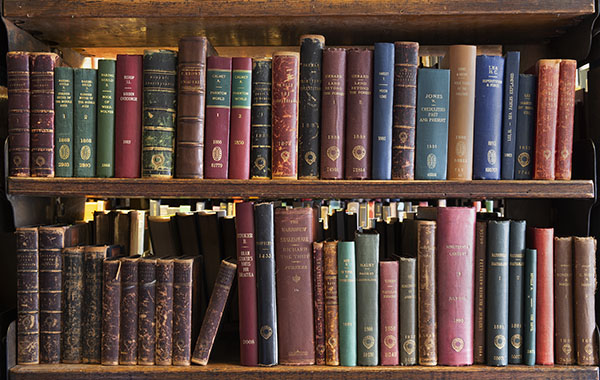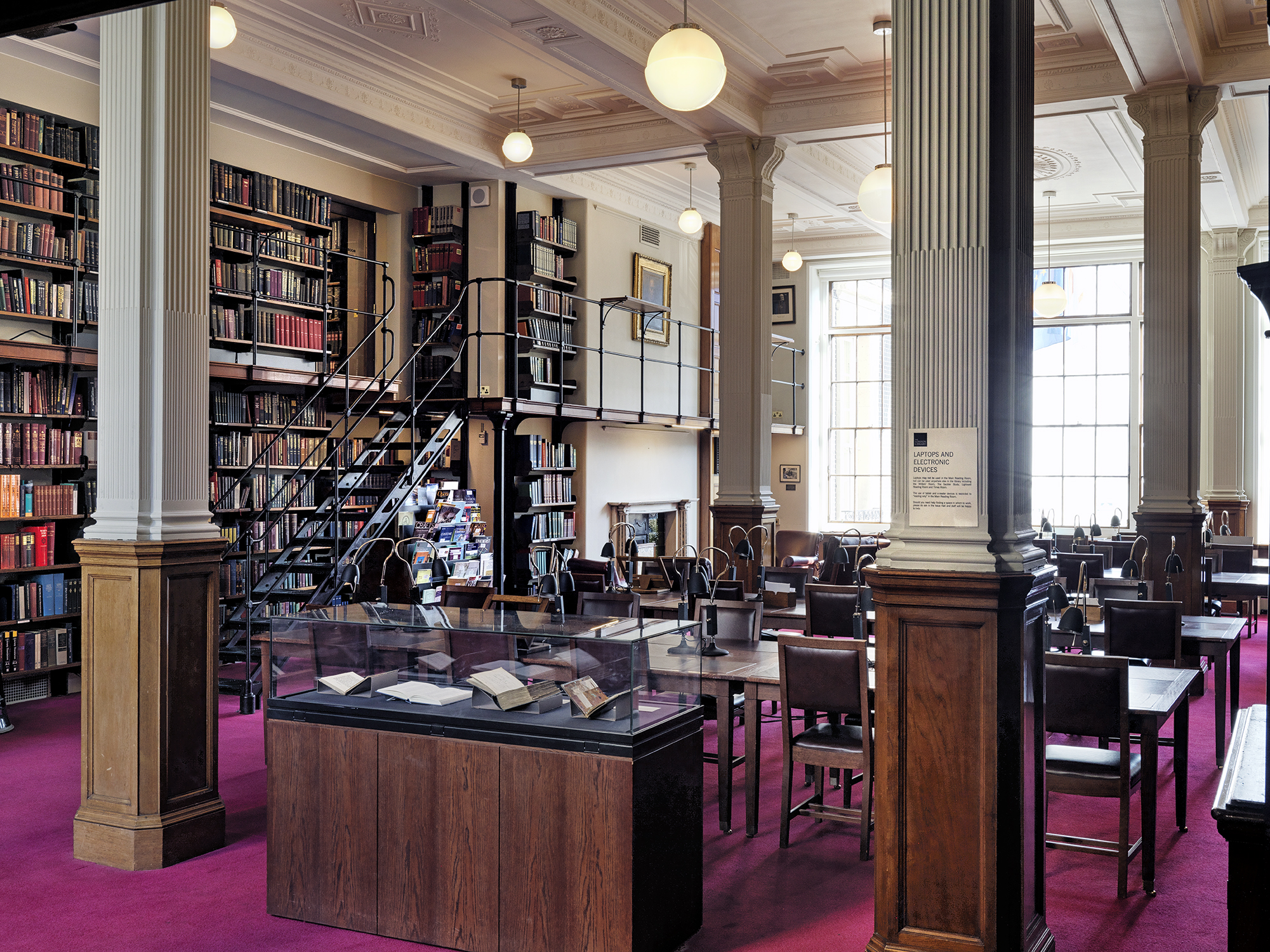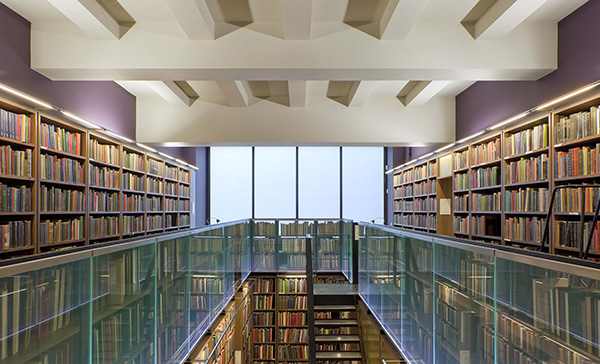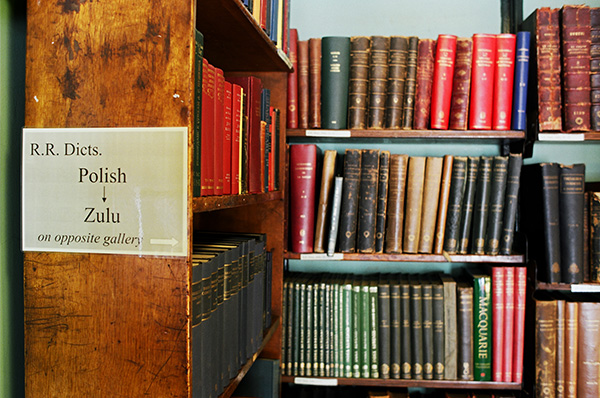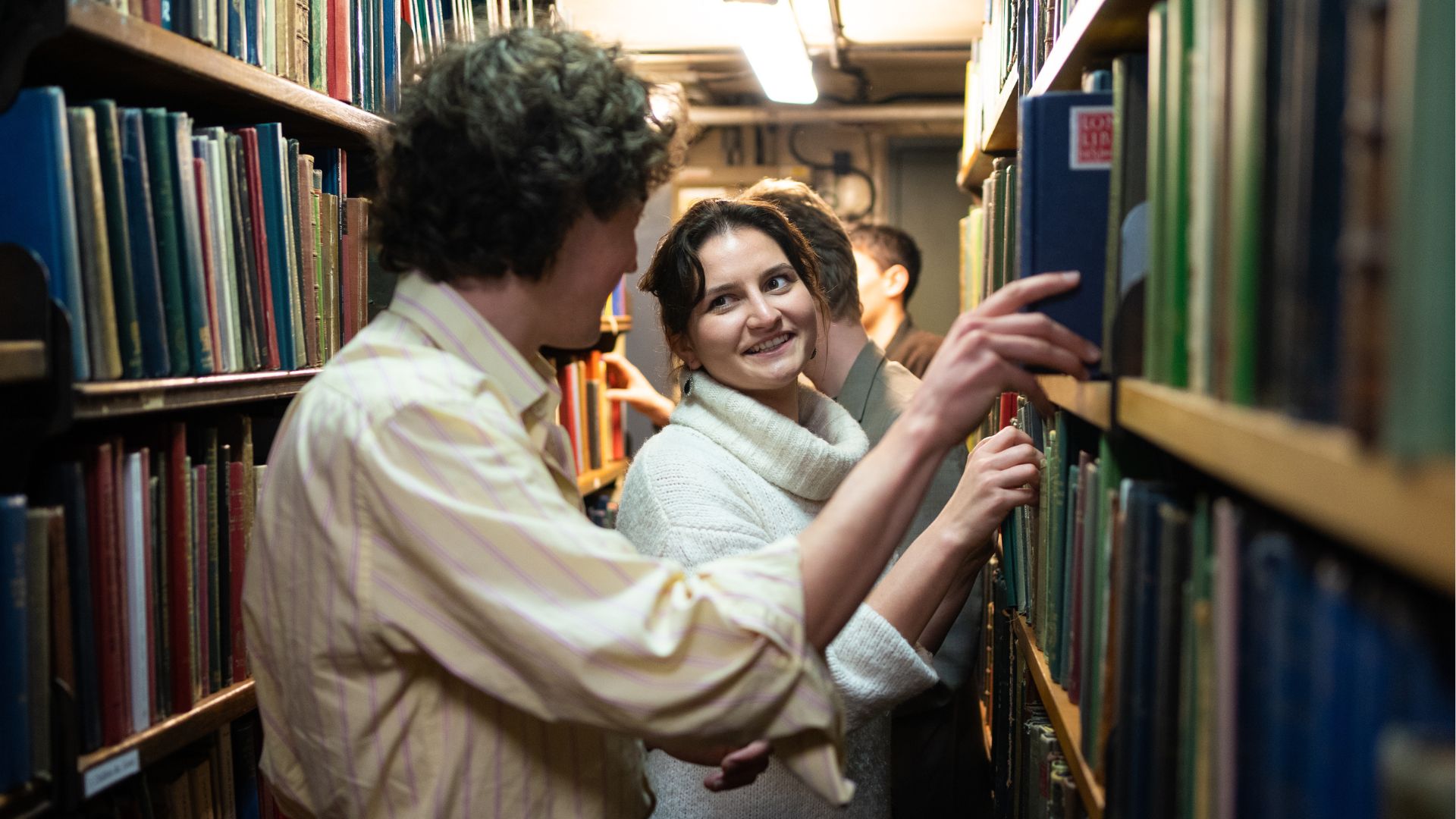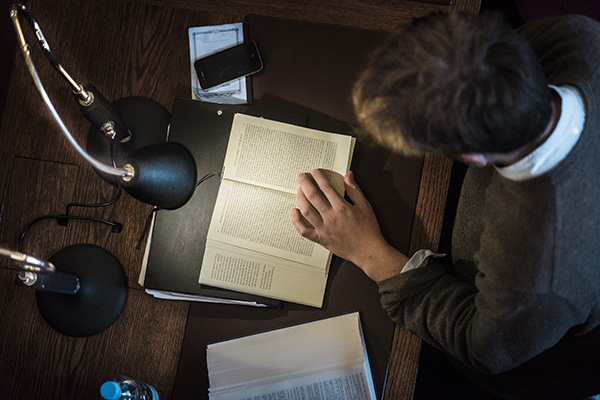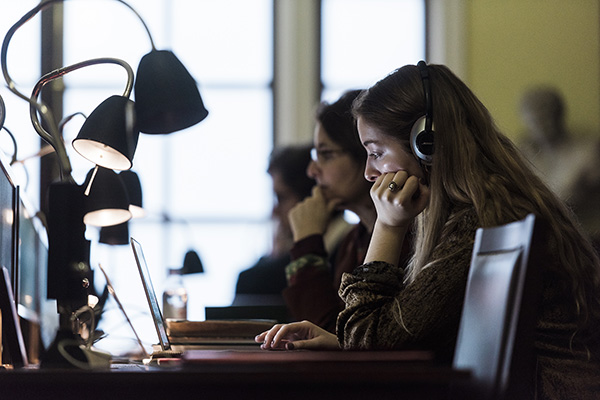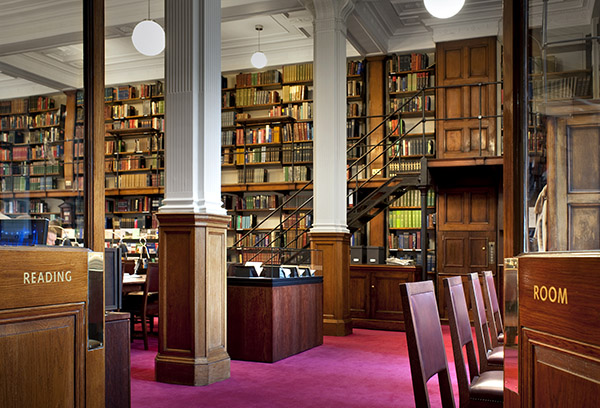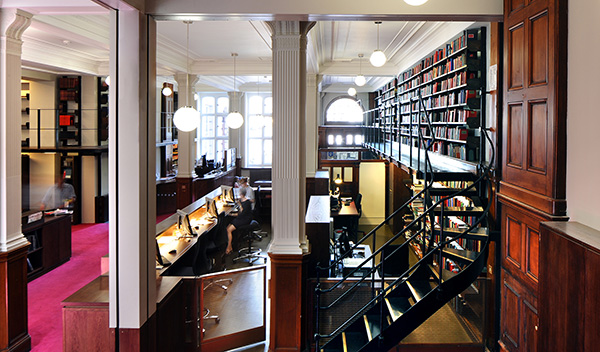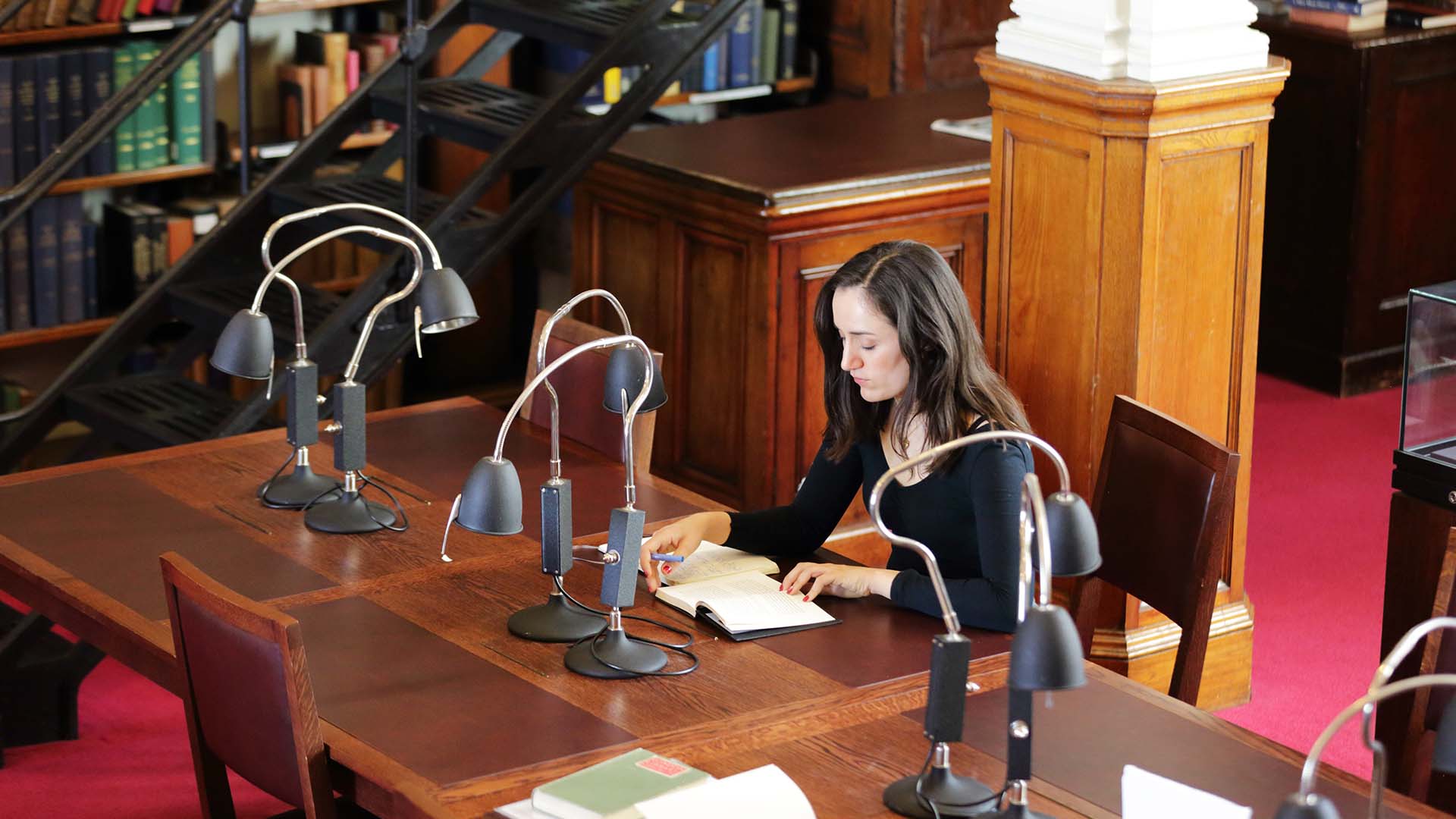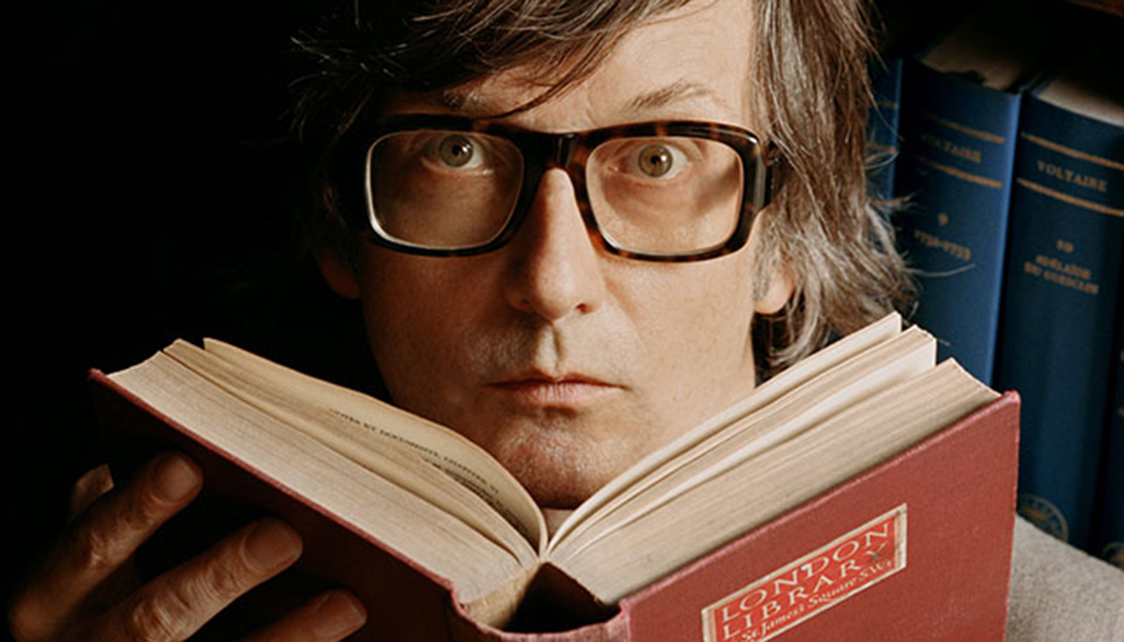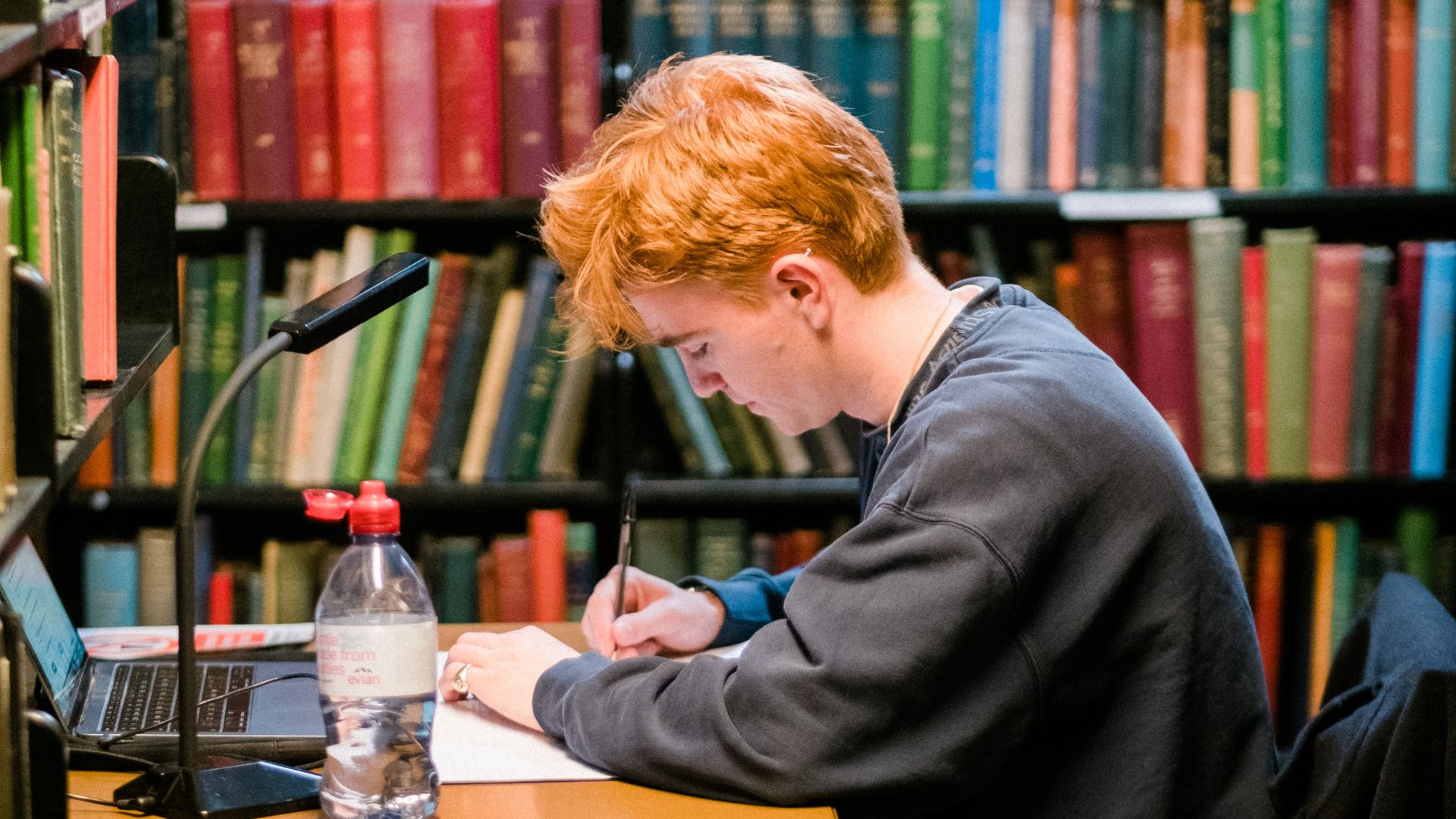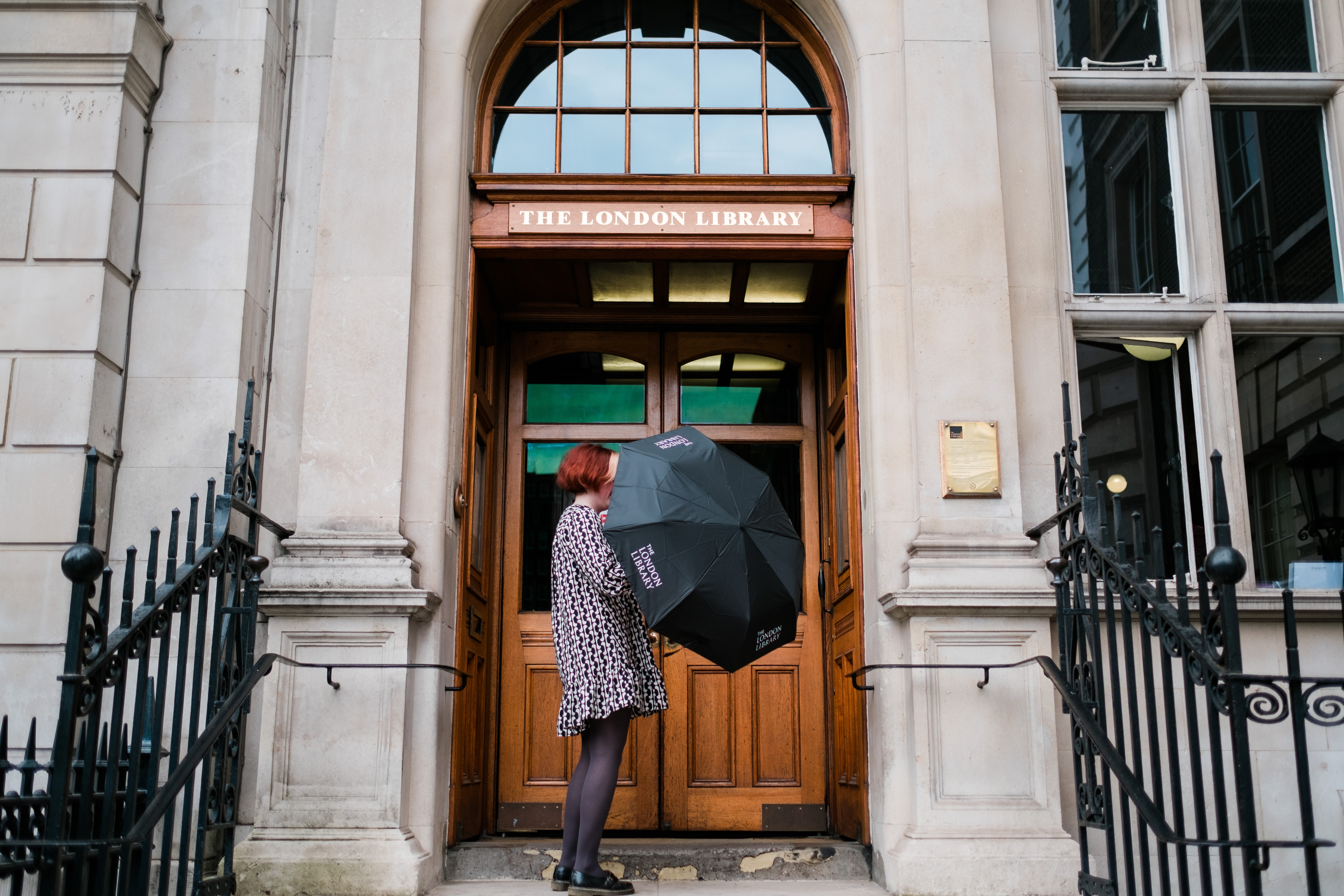The London Library today unveiled a fascinating discovery that sheds new light on how Dracula was researched and written. We've found 26 books that are almost certainly the original copies that Bram Stoker used to help research his enduring classic.
Philip Spedding, the Library’s Development Director who made the discovery, commented: “Bram Stoker was a member of The London Library but until now we have had no indication whether or how he used our collection. Today’s discovery changes that and we can establish beyond reasonable doubt that numerous books still on our shelves are the very copies that he was using to help write and research his masterpiece.”
Philip’s detective trail began with the collection of Stoker’s handwritten and typed notes that had been discovered in 1913 but only published in facsimile form in 2008*. The notes list a wide range of Stoker’s sources for Dracula and include hundreds of references to individual lines and phrases that he considered relevant. A recent trawl of our shelves has revealed that the Library has original copies of 25 of these books, carrying detailed markings that closely match Stoker’s notebook references.
The markings range from crosses and underlinings against relevant paragraphs, to page turnings on key pages, to instructions to have someone copy entire sections into his typewritten notes.


Some of the most heavily marked books include Sabine Baring-Gould’s “Book of Were-Wolves” and Thomas Browne’s “Pseudodoxica Epidemica”. But the range of titles also sheds light on the detail of Stoker’s geographical and historical research – for example, AF Crosse’s “Round About the Carpathians” and Charles’ Boner’s “Transylvania”.
The suggestion that Stoker was using the Library heavily is given added weight by the timing of his seven-year membership which coincides almost exactly with the period when he was working on Dracula and beginning to develop an active writing career alongside his already very successful role as theatre manager at The Lyceum Theatre. Earlier research by our Archive Librarian Helen O’Neill showed that he joined in 1890, the year he visited Whitby and first developed the idea for his vampire story, and he finally left the Library in 1897, the year Dracula was published. His membership form is seconded by his close friend Henry Hall Caine, a bestselling author of the day, a London Library member, and the man to whom Stoker dedicated Dracula, using Hall Caine’s nickname “Hommy-Beg”.

Philip Spedding continued, “It is almost certain that the books we have found have been marked up by Bram Stoker himself and that he drew heavily on The London Library’s collection to help research Dracula. Indeed, it is not fanciful to suggest that his extraordinary tale of the Transylvanian undead has many of its origins in the quiet confines of St. James’s Square.”
Professor Nick Groom from Exeter University and a leading expert on gothic literature said, “This is a very exciting discovery. I have examined the books and their annotations with Philip Spedding and have compared them with Bram Stoker’s own notes. I am in no doubt that Bram Stoker used these very copies for Dracula – a book that took him seven years to write. They demonstrate that The London Library was the crucible of one of the most influential novels in world history.”
Philip Marshall, Director of The London Library concluded: “Bram Stoker followed the same path that many writers have pursued before and since - using the Library to transition into a serious writing career, and drawing heavily on the Library’s collection to seek inspiration and ideas for his masterpiece. With the Library’s incredible list of members past and present, some of the most famous characters in fiction must have been developed here – with today’s discovery we can feel sure that Dracula was one of them. We hope that many aspiring writers will follow Bram Stoker’s example and use The London Library as a source of inspiration and support when creating their own masterpieces.”
Books referenced in Bram Stoker’s notebooks that are still on the Library’s shelves
- Nineteenth Century XVIII, Mme Emily de Laszowka Gerard, Kegan Paul, Trench & Co, July 1885
- The Book of Were-Wolves, Sabine Baring-Gould, Smith, Elder and Co, 1865
- Pseudodoxia Epidemica, Thomas Browne, 1672
- Magyarland, Nina Elizabeth Mazuchelli, Sampson Low, Marston, Searle & Rivington, 1881
- The Golden Chersonese, Isabella Bird, John Murray, 1883
- Round about the Carpathians, AF Crosse, Blackwoods, 1878
- On the Track of Crescent, Major EC Johnson, Hurst & Blackett, 1885
- Transylvania: Its Products and Its People, Charles Boner, Longman, Green, Reader & Dyer, 1865
- An Account of the Principalities of Wallachia and Moldavia, William Wilkinson, Longman, Hurst, Rees, Orme & Brown, 1820
- Curious Myths of the Middle Ages (2 vol), Sabine Baring-Gould, Rivington, 1868
- Germany Past and Present (2 vol), Sabine Baring-Gould, C Kegan Paul & Co, 1879
- Legends & Superstitions of the Sea, Bassett
- The Origin of Primitive Superstitions, Dorman, Lippincott, 1881
- Credulities Past & Present, W Jones, Chatto & Windus, 1880
- The Folk-Tales of The Magyars, The Rev W Henry Jones and Lewis L. Kropf, The Folk-Lore Society, 1889
- Superstition & Force, HC Lea, Lea Brothers & Co, 1892
- Sea Fables Explained, Henry Lee, William Cloves & Sons, 1883
- Anecdotes of the Habits and Instincts of Birds, Reptiles and Fishes, Mrs R Lee, Grant & Griffith, 1853
- The Other World; or, Glimpses of the Supernatural. Being Facts, Records, and Traditions, FG Lee, Henry S King & Co, 1875
- Letters on the Truths Contained in Popular Superstitions, Herbert Mayo, Blackwood, 1849
- The Devil: His Origin, Greatness and Decadence, Rev Albert Réville, Williams & Norgate, 1871
- A Tarantasse Journey through Eastern Russia in the Autumn of 1856, W Spottiswode, Longman, Brown, Green, Longmans & Roberts
- Miscellany, W Spottiswode
- Traité des Superstitions qui Regardent les Sacraments (4 vol), Jean-Baptiste Thiers, Louis Chambeau, 1777
- The Phantom World: or, The Philosophy of Spirits, Apparitions &c. (2 vol), Augustin Calmet, Richard Bentley, 1850
- The Land Beyond the Forest (2 vol), E Gerard, William Blackwood & Sons, 1888
Other books on the Library’s shelves not referenced in Stoker’s notebooks but containing comparable marginalia
- On the Truths Contained in Popular Superstitions with an Account of Mesmerism, H Mayo, William Blackwood & Sons, 1851
- La Magie et L'Astrologie dans L'Antiquité at au Moyen Age, Didier et Cie, 1860
- Anecdotes of the Habits and Instincts of Animals, Mrs R Lee, Grant & Griffith, 1852
- Narratives of Sorcery and Magic (2 vol), Thomas Wright, Richard Bentley, 1851
- Things not Generally Known. Popular Errors Explained, John Timbs, Kent & Co, 1858
- Roumania Past and Present, James Samuelson, Longmans, Green & Co, 1882
Books referenced in Bram Stoker’s notebooks no longer on the Library’s shelves
- A Glossary of Words used in the Neighbourhood of Whitby, FK Robinson
- The Natural & Supernatural of Man, John Jones,
- History & Mystery of Previous Stones, W Jones
- Superstition Connected with Hist & Medicine
Books referenced in Bram Stoker’s notebooks never held by the Library
- Fishery Barometer Manual, Robert Scott
- The Theory of Dreams (2 vol), FC & J Rivington, St. Pauls Churchyard, 1808
- Sea Monsters Unmasked, Henry Lee
- A report in IBIS on "The Birds of Translyvania", Danford and Brown
* ‘Bram Stoker’s Notes For Dracula’ was published in 2008 in a facsimile edition annotated and transcribed by Robert Eighteen-Bisang and Elizabeth Miller
 We are continuing to make progress with the project to replace the windows on the Lightwell Room side of the St James’s stacks (which have now deteriorated beyond the point where they can be realistically repaired). We are installing custom-made replacements which will look nearly identical (and feature identical window stays), but will also be double-glazed and reduce the current levels of solar gain.
We are continuing to make progress with the project to replace the windows on the Lightwell Room side of the St James’s stacks (which have now deteriorated beyond the point where they can be realistically repaired). We are installing custom-made replacements which will look nearly identical (and feature identical window stays), but will also be double-glazed and reduce the current levels of solar gain.
Although there have been some initial delays arising from the new windows being delivered later than anticipated, we expect all the new windows and fittings to have been installed by the end of August. We will be able to remove the scaffolding shortly afterwards and begin decorating the walls adjacent to the new windows. We hope to complete this work and remove the protective covering on that side of the stacks by early/mid-September
The windows replacement work is part of a wider project that will see a significant improvement of member facilities with the installation of 12 new desks in the stacks and upgrades to the existing six. The new desks will be housed on the three floors overlooking St James’s Square and to make way for them we are removing the modern metal bookshelves currently in position, and re-locating the books they contain elsewhere within the Library. The book moving work is already underway, and the shelves will be removed in early September, after which additional power sockets will be installed. We will then begin two weeks of work to decorate the walls on the St James’s Square side of the stacks. We anticipate some noise and disruption during this work and protective covering will be in place on adjacent stacks, but it should be complete by early/mid-October with installation of new oak and leather inlaid desks taking place by the end of October.
We are extremely grateful to everyone for putting up with the disruption that has inevitably accompanied the works so far and hope that members can bear with us while the works are being completed. The wait should be worth it. The installation of 12 new desks will expand the Library’s overall desk provision by nearly 10% and should mean that spare desks will be easier to find during busy periods. It will also help with our wider ambition to increase membership numbers, which as we have communicated previously is a fundamental part of ensuring a stable financial position for the Library.
In thanking everyone for their tolerance while the works are underway, we also want to thank everyone who has given so generously to the windows replacement appeal. The Appeal has raised enough funds to cover all of the work, meaning that none of it now needs to come out of operating resources. This is an enormously helpful result and we are extremely grateful for all the very generous support we have received.
The Library will remain open for the duration of the window replacement project. We will try to keep disruption to members to a minimum, but there may be some increased noise and activity.
The St. James's Building book stacks will be kept as accessible as possible, but some desks may not be in use and some shelves may have a protective covering. The desks overlooking St. James's Square will remain available, but the area may be warmer, noisier and dustier than usual.
Window replacement is scheduled to take four weeks. Scaffolding will start going up on Monday 9th July and building work should be complete by the end of August. If you encounter any problems, or need help accessing books or finding a working space, please do speak to a member of staff.
THANK YOU to everyone who has already donated to the Windows Appeal. Your support is so important to the Library, and has helped make this vital project possible. You can still donate to the Appeal. All funds raised will go towards the replacement of the windows or subsequent improvements to the St. James's Building book stacks. Donate online here, or using a donation form available from reception.
The London Library is collaborating with the Bloomsbury Institute, the public events series created by Bloomsbury Publishing, on a series of events this summer and autumn.
The London Library and the Bloomsbury Institute are delighted to be working together on a vibrant series of literary occasions, which will embrace the strengths of the Library’s 1 million-strong lending collection and the excellence of Bloomsbury’s publishing.
The first three events, featuring Bloomsbury authors Diane Atkinson, Mohammed Hanif and Agnès Poirier, will be held in the elegant Reading Room of the London Library in 2018 before an audience of avid readers, writers and academics, and will be followed in early 2019 by events at Bloomsbury’s elegant headquarters on Bedford Square.
Philip Marshall Director of The London Library comments:
“We are delighted to be working with the Bloomsbury Institute, an independent publisher with an inspiring range of books and authors. The series of events we have co-curated promises to be thought-provoking and entertaining and we are excited to welcome new audiences into The London Library, a place of inspiration for so many. We look forward to continuing our collaborative work with the Bloomsbury Institute over the years to come."
Nigel Newton, Founder and Chief Executive of Bloomsbury Publishing comments:
“I’m very pleased about this new partnership of the Bloomsbury Institute with The London Library. As a library where many Bloomsbury authors research and write their books, this collaboration is a good one. We look forward to staging author events together in the months and years to come.”
The London Library and Bloomsbury Institute Events Programme:
 Diane Atkinson, The Remarkable Lives of the Suffragettes
Diane Atkinson, The Remarkable Lives of the Suffragettes
5 July 2018, The London Library
Marking the centenary of female suffrage, Diane Atkinson discusses her definitive history Rise Up Women!, charting women's relentless fight for the vote through the lives of those who took part.
Diane Atkinson is the author of two illustrated history books and three biographies and is a regular lecturer and commentator on the suffragettes at conferences, literary festivals and in the media.
 Mohammed Hanif, Red Birds
Mohammed Hanif, Red Birds
11 October 2018, The London Library
Dubbed 'Pakistan's brightest voice' by the Guardian, bestselling prize-winning author, Mohammed Hanif, discusses his brand new novel, Red Birds, a powerful work about war, family and love.
Mohammed Hanif was born in Okara, Pakistan. His first novel, A Case of Exploding Mangoes, was longlisted for the Man Booker Prize, shortlisted for the Guardian First Book Award and won the Commonwealth Writers’ Prize for Best First Novel. His second novel, Our Lady of Alice Bhatti, was shortlisted for the 2012 Wellcome Prize. He writes regularly for The New York Times, The New Yorker, BBC Urdu, and BBC Punjabi.
 Agnès Poirier, Left Bank Art, Passion and the Rebirth of Paris, 1940-1950
Agnès Poirier, Left Bank Art, Passion and the Rebirth of Paris, 1940-1950
8 November 2018, The London Library
Agnès Poirier paints a captivating portrait of those who lived, loved, fought, played and flourished in Paris between 1940 and 1950 and whose intellectual and artistic output still influences us today.
Agnès Poirier is a Paris-born and London-educated journalist, writer, critic and broadcaster. She is an authority on the different ways in which France and Britain do things, a topic she frequently discusses on the BBC, Sky News and CNN and writes about in, among others, The Observer, The Times, Marianne, Télérama and L’Espresso
All events are open to The London Library members and non-members. To find out more and to book tickets, visit: http://www.londonlibrary.co.uk/about-us/whats-on
Read more: THE LONDON LIBRARY UNVEILS PARTNERSHIP WITH THE BLOOMSBURY INSTITUTE

